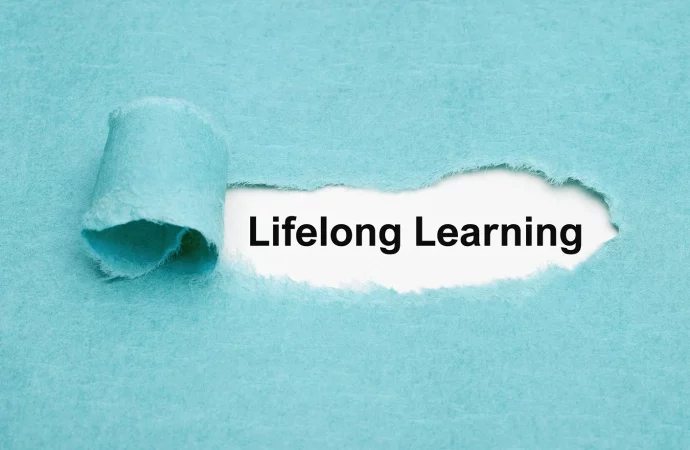Introduction In an age of rapid change—from new technologies reshaping industries to evolving social and environmental challenges—staying still is not an option. Lifelong learning has become essential for personal growth, career success, and civic engagement. Whether through online courses, hands‑on workshops, or everyday experiences, continuous education equips us with fresh skills, sharpens our minds, and
Introduction
In an age of rapid change—from new technologies reshaping industries to evolving social and environmental challenges—staying still is not an option. Lifelong learning has become essential for personal growth, career success, and civic engagement. Whether through online courses, hands‑on workshops, or everyday experiences, continuous education equips us with fresh skills, sharpens our minds, and opens doors to new opportunities. In this article, we explore the importance of lifelong learning, its benefits, and practical ways to embrace a learning mindset at any stage of life.
Why Lifelong Learning Matters More Than Ever
1. Adapting to a Rapidly Changing World
In the past, many people learned a trade or earned a degree and stayed in a single career for life. Today, automation, globalization, and digital transformation mean that job requirements can shift dramatically within years—or even months. Lifelong learners can pivot, upskill, and stay ahead of emerging trends.
2. Boosting Employability and Career Growth
Employers value professionals who show initiative to learn new tools and methods. A survey by the World Economic Forum found that by 2025, over half of all workers will need significant reskilling. Those who commit to continuous education demonstrate adaptability and leadership potential.
3. Enhancing Personal Fulfillment
Beyond work, learning brings joy and self‑confidence. Mastering a new language, understanding world history, or exploring a hobby can improve mental health and enrich daily life. Lifelong learning helps prevent cognitive decline and fosters a sense of purpose.
Key Benefits of Lifelong Learning
1. Improved Cognitive Function
Engaging the brain in new challenges—like puzzles, languages, or coding—builds neural connections. Studies show that adults who learn continuously are less likely to experience memory loss and age‑related cognitive decline.
2. Expanded Career Opportunities
Adding certifications or skills—such as data analysis, project management, or public speaking—can make you eligible for promotions or new roles. Continuous learners often command higher salaries and enjoy greater job security.
3. Stronger Social Connections
Classes, workshops, and online forums introduce you to peers who share your interests. These networks can lead to collaborations, mentorships, and lifelong friendships.
4. Greater Adaptability
A commitment to learning fosters resilience. When faced with unexpected challenges—like a global pandemic or economic downturn—lifelong learners are more likely to find creative solutions and bounce back.
5. Enhanced Creativity
Learning exposes you to diverse fields and ways of thinking. Cross‑disciplinary knowledge leads to fresh ideas, from inventing new products to developing innovative business models.
How to Cultivate a Lifelong Learning Mindset

Image by: Yandex.com
1. Embrace Curiosity
Start with questions. Ask “Why does this work?” or “How can I improve?” Curiosity drives you to seek answers in books, online resources, or conversations with experts.
2. Set Learning Goals
Define what you want to achieve: “Learn basic Spanish in six months” or “Master Excel pivot tables by year’s end.” Clear targets make progress measurable and keep you motivated.
3. Schedule Regular Learning Time
Treat learning like an appointment. Block 30 minutes daily or two hours weekly to read, watch tutorials, or practice new skills. Consistency beats cramming in results.
4. Use Mixed Formats
Combine formal coursework (MOOCs, certifications) with informal methods (podcasts, YouTube channels, DIY projects). This variety keeps learning fresh and engaging.
5. Reflect and Apply
After learning something new, take time to reflect. Write a summary, teach a friend, or apply your skills in a real‑world project. Application deepens understanding and builds confidence.
Top Resources for Lifelong Learners
1. Online Learning Platforms
- Coursera: Offers courses and specializations from top universities.
- edX: Free and paid courses on diverse subjects.
- Udemy: Affordable courses on tech, business, and personal development.
2. Local Workshops and Community Colleges
Many community centers and colleges offer night classes in arts, languages, and technical skills—often at low cost or with scholarships.
3. Public Libraries
Libraries provide free access to books, audiobooks, online courses (LinkedIn Learning), and discussion groups. Membership is often free.
4. Professional Associations
Industry groups host conferences, webinars, and certification programs. These events offer networking and hands‑on training.
5. Informal Learning
Podcasts, YouTube channels, and blogs can teach anything from cooking to coding. Seek creators who explain concepts clearly and offer practice exercises.
Overcoming Common Barriers
1. Time Constraints
Busy schedules make learning feel impossible. Solution: micro‑learning—short, focused sessions that fit into breaks or commutes.
2. Information Overload
Endless resources can overwhelm beginners. Solution: choose one reputable course or book at a time. Focus on core principles before branching out.
3. Fear of Failure
Trying new skills can feel intimidating. Solution: adopt a growth mindset: view mistakes as research, not rejection. Celebrate small wins along the way.
4. Cost Concerns
Quality courses can be expensive. Solution: start with free resources, apply for scholarships, or use public library services. Many MOOCs offer financial aid.
Real‑World Examples of Lifelong Learning
1. Tech Professional Upskilling
Sarah, a web developer, spent evenings learning Python through Codecademy. Within a year, she transitioned into data science, boosting her salary by 40%.
2. Mid‑Career Career Change
At age 45, Jorge left retail management to enroll in HVAC courses at his local college. His new certification led to steady work in renewable energy installation.
3. Hobby to Side Hustle
Emma, a graphic designer, learned 3D modeling on YouTube. She now sells her digital art as NFTs, earning passive income and expanding her creative network.
The Role of Employers and Governments
1. Employers
- Offer Training Programs: On‑site or online courses paid by the company.
- Encourage Learning Culture: Recognize employees who complete certifications.
- Provide Mentorship: Pair junior staff with experienced mentors.
2. Governments
- Subsidize Adult Education: Tax credits or vouchers for courses.
- Invest in Public Libraries: Expand digital resources and workshops.
- Promote Lifelong Learning Campaigns: Raise awareness of its importance for economic growth.
Conclusion
In today’s fast-paced world, the importance of lifelong learning cannot be overstated. Continuous education empowers individuals to adapt to new challenges, advance their careers, and enrich their personal lives. By embracing curiosity, setting clear goals, and leveraging diverse resources—from online platforms to community workshops—you can build and maintain a learning habit that lasts a lifetime. Employers and governments play key roles in supporting this journey through training programs and public initiatives. Ultimately, lifelong learning is not just about acquiring skills—it’s about cultivating resilience, creativity, and the confidence to thrive in a constantly changing world. Start your learning adventure today, and watch it transform your tomorrow.
















